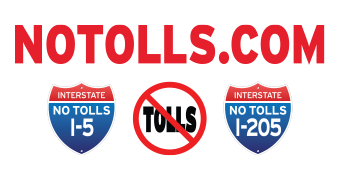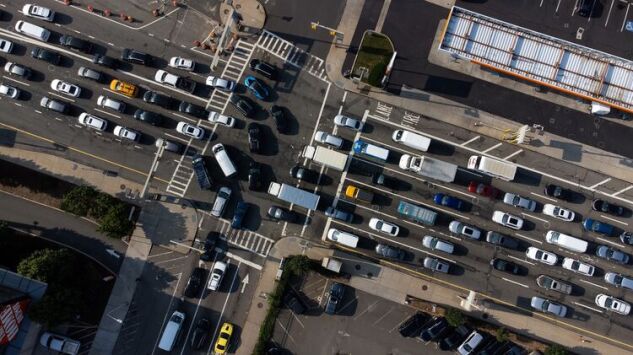Tolling vehicles to pay for mass transit upgrades
- Wednesday hearing follows lawsuit over city’s tolling plan
- New Jersey blasts environment review, seeks deeper assessment
Lawyers for New Jersey mounted a last-ditch effort to derail a New York program to charge most drivers $15 to enter central Manhattan during peak hours, urging a federal judge to require a more thorough review of the congestion-pricing plan’s environmental impact.
The judge who oversaw a hearing Wednesday would almost certainly delay the program’s mid-June start if he grants the request to authorize a deeper review of the plan’s impact on pollution and traffic in neighboring New Jersey. The plan is expected to help the Metropolitan Transportation Authority raise $15 billion to modernize New York City’s transit system.
Attorney Randy Mastro argued on New Jersey’s behalf that the Federal Highway Administration fast-tracked its assessment and ignored concerns about the pollution and congestion that new traffic patterns would create. At the daylong hearing, Mastro said the agency failed to follow required procedures and cherry-picked data in a way that hurts New Jersey and its communities.
“Everyone realizes the MTA is going to make a boatload of money,” Mastro said in federal court in Newark. He accused the highway agency of being “fed by the MTA” and said its review amounted to a “slap-dash, back-of-the-envelope” effort.
The hearing, which resumes on Thursday, follows a lawsuit New Jersey filed in July against the US Department of Transportation and its Highway Administration after the agency said the program would have no significant environmental impact.
Fierce Opposition
The congestion pricing plan, a first in the US, is intended to reduce traffic and pollution and help the MTA raise funds to upgrade a more than century-old transit system. But the program has spurred fierce opposition, both from commuters and New Jersey, which branded the program a “brazen money grab.”
Read More: Love It or Hate It — New Yorkers Weigh In on Congestion Tolling
The MTA, which was added as a defendant in January, seeks to implement the new toll after its board last week approved the pricing structure. But legal challenges could push back the start date. Judge Leo M. Gordon has signaled he will rule on the New Jersey case by early June. Arguments in related lawsuits will be heard in federal court in Manhattan on May 17.
Any delay in the new toll will affect the MTA’s ability to improve its infrastructure. It plans to commit only $2.9 billion for capital projects this year, a sharp drop from the $12 billion of work it could enter into if the congestion pricing plan launched.
‘Delay, Delay, Delay’
At Wednesday’s hearing, a lawyer for the transit agency accused New Jersey of using the lawsuit to push back the start date.
“The reasons are clear — it’s delay, delay, delay,” attorney Mark Chertok said, adding that the case for New Jersey was “about money” and not the environment.
QuickTake: What Congestion Pricing’s Arrival in NYC Would Mean
Mastro argued that the MTA’s plan to mitigate environmental harms unfairly allots $155 million to New York projects while committing to no specific improvements in New Jersey. He said the environmental plan punishes New Jersey with hollow MTA promises of future improvements.
“This is like three-card monte,” he told the judge. “They say, ‘We’re New York, trust us.’”
But another lawyer representing the MTA, Elizabeth Knauer, disputed the allegation that the agency isn’t committed to lessening the impact of pollution.
“I take great issue that there are no dollar amounts committed,” Knauer said.
Knauer defended the methodology of the environmental review, and said the congestion pricing plan would not adversely impact the environment.
“The negative effects on air quality are really small,” Knauer said. She said the judge should not order a wider study known as an environmental impact statement.
How It Works
The toll will apply once a day to motorists driving into the central business district, which runs from 60th Street down to the southern tip of Manhattan. Under the plan, passenger cars with E-ZPass will pay $15 during peak periods, with E-ZPass trucks paying $24 during those hours, or $36 for larger trucks. Vehicles without E-ZPass would pay more. Peak hours are 5 a.m. to 9 p.m. on weekdays and 9 a.m. to 9 p.m. on weekends.
Drivers already paying tolls on the Lincoln, Holland, Queens-Midtown or Brooklyn-Battery tunnel will receive discounts during peak times to help lower the new fee. Driving during the overnight hours would be cheaper: E-ZPass passenger cars will pay $3.75 while E-ZPass trucks will pay $6.
Read More: NYC Congestion Pricing Wins Key Approval From Transit Board
Many of the district’s residents say it requires them to pay a charge just to return home and will be an additional expense for the area’s small businesses that will have to absorb the cost or pass it on to customers.
The lawsuits have already forced the MTA to halt some capital projects that rely on congestion pricing revenue. The transit agency postponed subway signal upgrades in Manhattan and Brooklyn that would reduce delays. Adding elevators to train stations, purchasing new subway cars and extending the Second Avenue subway line to Harlem are also at risk of being delayed.
The case is New Jersey v. US Department of Transportation, 23-cv-3885, US District Court, District of New Jersey (Newark).
(Updates with MTA lawyer’s arguments.)
–With assistance from Michelle Kaske.
To contact the reporters on this story:
Ethan M Steinberg in New York at esteinberg24@bloomberg.net;
David Voreacos in New York at dvoreacos@bloomberg.net;
Chris Dolmetsch in Federal Court in Manhattan at cdolmetsch@bloomberg.net



